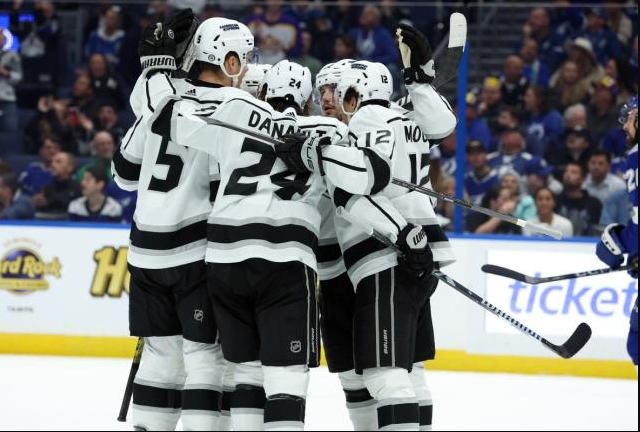
3 Takeaways From the Wild’s 5-1 Loss Against the Kings

The Minnesota Wild wrapped up a three-game homestand on Tuesday, Nov. 5, facing off against the Los Angeles Kings. With their lineup remaining mostly unchanged except for defenseman Jon Merrill slotting in and Declan Chisholm being the healthy scratch, the Wild entered the game hoping to build on a solid record early in the season. Filip Gustavsson, fresh off a pair of wins, was looking for his third consecutive victory in net.
The game, however, did not go as planned for Minnesota. Despite starting with an energetic pace, the Wild ultimately fell to the Kings by a score of 5-1. The loss stung for the Wild, particularly as they had led briefly in the second period before a series of events — including an injury to Kirill Kaprizov — led to the eventual defeat. While the result was disappointing, it’s important to remember that the loss marked just the second regulation defeat in 12 games for the Wild, still a very respectable record at this stage of the season.
In this article, we’ll explore three key takeaways from the game against the Kings, including the areas where Minnesota struggled, what went wrong with their special teams, and one silver lining in the performance of their defense.
1. The Wild’s Lack of Spark
One of the biggest takeaways from the Wild’s loss to the Kings was the team’s lack of energy and urgency throughout the game. Early in the season, the Wild were playing with an infectious energy. Their forecheck was aggressive, they were consistently beating opponents to loose pucks, and their fast, physical play made it difficult for opposing teams to establish their game. That high-energy style of hockey was a major factor in their success.
However, against the Kings, that spark just wasn’t there. In the first period, the Wild had some good moments and seemed to be playing with some jump. However, when they couldn’t convert on their chances, their energy levels seemed to drop, and that lack of sustained intensity was apparent as the game progressed.
This was particularly evident when Kirill Kaprizov was hit in the face with a puck during the second period. Kaprizov, the Wild’s dynamic leader and one of their most important players, left the ice after the injury and did not return for the remainder of the period. It’s clear that his presence is a significant factor in Minnesota’s momentum, and without him on the ice, the team seemed to lose some of the spark that had been driving their play.
Even after Kaprizov returned for the third period, the Wild were unable to generate much offense. The Kings took full advantage of Minnesota’s faltering energy, scoring two unanswered goals in the second period, and the Wild just couldn’t mount any significant pressure in the third.
The Wild’s energy and urgency were noticeably absent, and that played a key role in their inability to recover from the Kings’ scoring surge. For a team that has thrived on intensity and determination this season, Minnesota will need to find a way to get that spark back. Whether it’s through better starts, improved puck battles, or relying on leaders like Kaprizov to energize the group, the Wild need to rediscover the relentless pace that has made them successful so far.
2. Struggles on Special Teams
Another area where the Wild struggled in the loss to the Kings was on special teams. Special teams have been a mixed bag for Minnesota this season, but against the Kings, both the power play and penalty kill failed at critical moments, and it ultimately cost them the game.
The Wild had multiple opportunities on the power play but were unable to capitalize. They were awarded four power plays during the game, but despite generating some decent chances, they couldn’t find the back of the net, going 0-for-4 on the night. The Kings, on the other hand, made the most of their lone power-play opportunity, converting on 1-of-1 chances. While the Wild’s power play had looked solid earlier in the season, they’ve struggled over the past few games, and this one was no exception. With the team already trailing by a goal heading into the third period, the inability to convert on the power play was a missed opportunity to get back into the game.
Worse still was Minnesota’s penalty kill, which allowed the eventual game-winning goal. The Wild had been decent on the penalty kill early in the season, but in recent games, they’ve allowed more power-play goals than they would like. Against the Kings, the special teams breakdowns were costly, and the inability to execute when they had the advantage ultimately sealed their fate.
That said, there was a slight silver lining for the Wild on the special teams front: they only took one penalty during the game, aside from the coincidental minors for roughing. That was an improvement, as the team had been getting into penalty trouble in previous games. If the Wild can continue to stay out of the box and execute better on both the power play and penalty kill, they will be in much better shape moving forward. However, it was clear in this game that the special teams struggles played a large role in their defeat, and that’s an area that will need to improve if they are to remain a playoff contender.
3. The Defense Getting More Involved
On a more positive note, one area where the Wild showed improvement was in the offensive contributions from their defensemen. In previous seasons, Minnesota’s defense had been largely focused on playing a conservative, stay-at-home style, rarely venturing into the offensive zone beyond the blue line. But this year, the Wild’s defense has been more active, with defensemen jumping into the play and getting involved in the offensive zone.
This new approach was evident in the loss to the Kings. Zach Bogosian, who scored the Wild’s lone goal in the first period, is a prime example of the defense’s offensive involvement. Bogosian’s goal was his first of the season, and it was a result of his willingness to get involved in the attack. But it’s not just Bogosian; other Wild defensemen like Jake Middleton, Brock Faber, and Jared Spurgeon have also been more active offensively. Middleton, for example, registered three shots on goal in the game, while Faber added two. Spurgeon also took three shots. Even Jonas Brodin, typically known for his strong defensive play, jumped into the offensive zone and nearly created a scoring opportunity late in the game.
The involvement of the defense in the offensive zone is a key change for the Wild this season. They are not only getting shots from the point but also creating opportunities with their movement and puck skills. By doing so, they are helping to alleviate some of the offensive pressure from their forwards and creating more balanced attack opportunities. This approach is something the Wild can build on as they continue to develop their overall game.
Jon Merrill, who had his struggles last season, has also looked more confident this year. While still prone to the occasional mistake, Merrill has been more assertive in his play, and his presence in the lineup has provided the Wild with solid depth on the blue line.
A Quick Road Trip
The Wild’s loss to the Kings may have been frustrating, but it’s just one setback in what has been a promising season. Minnesota now moves on to a quick road trip with back-to-back games against the San Jose Sharks and the Anaheim Ducks. The Sharks, who have recently welcomed Macklin Celebrini back into the lineup, will provide a tough test. And the Ducks, with their young core, are also a team that can be dangerous when they get on a roll.
The Wild will need to regroup and address their areas of concern — namely the lack of energy, special teams issues, and maintaining strong defensive involvement in the attack. If they can correct these aspects of their game, they’ll be in a good position to bounce back from the loss and come away with a pair of wins on the road.

Leave a Reply